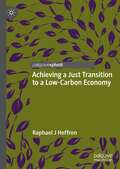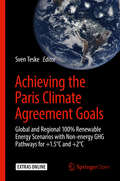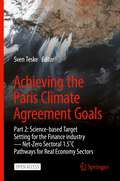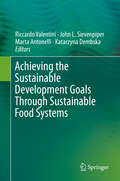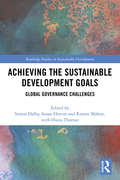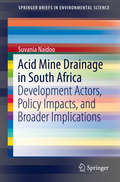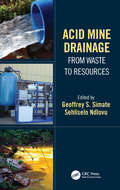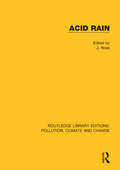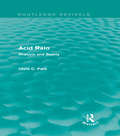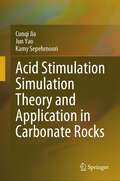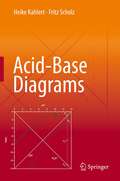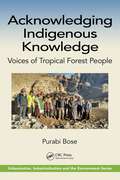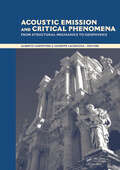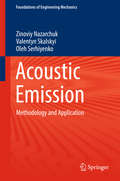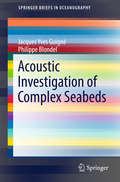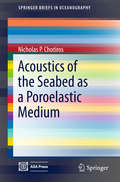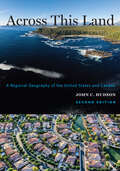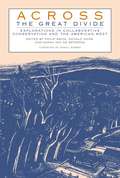- Table View
- List View
Achieving a Just Transition to a Low-Carbon Economy
by Raphael J HeffronThe ambition of most countries across the world is to develop a low-carbon economy, evidenced by the fact that the vast majority of countries have signed the Paris COP21 agreement. This book contends that this global societal transition to a low-carbon economy must be just. As such, it will be an invaluable and accessible reference for scholars from all research disciplines who aim in their research to see a fairer, more equitable and inclusive world where sustainability is at the fore and climate targets are achieved.This is the first in-depth and original analysis to explore the central importance of law in achieving a just transition to a low-carbon economy. In addition, it advances the JUST framework, a unique framework for assessing the just transition. This important research and theoretical tool provides a practical perspective as it ensures the geographical space and timelines of development are factored into analysis. The research also provides analysis on the just transition movement around the world and the influence of international institutions.Through several case studies on Just Transition Commissions and Critical Mineral Development, the book details and demonstrates key elements of justice, including distributive, procedural, restorative, recognition, and cosmopolitan justice. It is clear from the analysis that while these are vast areas for analysis, if applied in practice, they all centrally contribute to ensuring society will advance in achieving a just transition to a low-carbon economy.
Achieving the Paris Climate Agreement Goals: Global and Regional 100% Renewable Energy Scenarios with Non-energy GHG Pathways for +1.5°C and +2°C
by Sven Teske<p>This open access book presents detailed pathways to achieve 100% renewable energy by 2050, globally and across ten geographical regions. Based on state-of-the-art scenario modelling, it provides the vital missing link between renewable energy targets and the measures needed to achieve them. Bringing together the latest research in climate science, renewable energy technology, employment and resource impacts, the book breaks new ground by covering all the elements essential to achieving the ambitious climate mitigation targets set out in the Paris Climate Agreement. For example, sectoral implementation pathways, with special emphasis on differences between developed and developing countries and regional conditions, provide tools to implement the scenarios globally and domestically. Non-energy greenhouse gas mitigation scenarios define a sustainable pathway for land-use change and the agricultural sector. Furthermore, results of the impact of the scenarios on employment and mineral and resource requirements provide vital insight on economic and resource management implications. <p>The book clearly demonstrates that the goals of the Paris Agreement are achievable and feasible with current technology and are beneficial in economic and employment terms. It is essential reading for anyone with responsibility for implementing renewable energy or climate targets internationally or domestically, including climate policy negotiators, policy-makers at all levels of government, businesses with renewable energy commitments, researchers and the renewable energy industry.</p>
Achieving the Paris Climate Agreement Goals: Part 2: Science-based Target Setting for the Finance industry — Net-Zero Sectoral 1.5˚C Pathways for Real Economy Sectors
by Sven TeskeThis open access book is designed as a continuation of the editor’s 2019 book Achieving the Paris Climate Agreement Goals. This volume provides an in-depth analysis of industry sectors globally, and its purpose is to present emission reduction targets in 5-year steps (2025 to 2050) for the main twelve finance sectors per the Global Industry Classification System. This scientific analysis aims to support the United Nations Principles for Responsible Investment initiative to give sustainability guidance for the global finance industry. The industry sector pathways presented here are based on the latest global and regional 100% renewable energy and non-energy greenhouse gas Representative Concentration Pathways in order to keep climate change significantly under +1.5 C and thereby achieve the Paris Climate Agreement goals. The heart of this book is three chapters presenting the results of industry scenario modelling. These chapters cover twelve industry and service sectors as well as transportation and buildings. The specific energy demand and specific emissions are presented based on the emission accounting concept of “Scope 1, Scope 2 and Scope 3” emission pathways. This methodology has been developed to measure the climate and sustainability index for companies, and this research project expands the methodology to apply it to entire industry sectors. The results presented here are the first overall industry assessments under Scope 1, 2 and 3 from 2020 through 2050. The base for the energy pathways is the scenarios scenarios published in the previous volume. The nonenergy GHG emission scenarios, broken down to agriculture & forestry and industry, are detailed and include all major greenhouse gases and aerosols. The final section of the book presents the main conclusions of the industry pathway development work and recommendations for the finance industry and policy makers. Additionally, future qualitative future investment requirements in specific technologies and measures are presented.
Achieving the Sustainable Development Goals Through Sustainable Food Systems (Food And Health Ser.)
by Marta Antonelli Riccardo Valentini John L. Sievenpiper Katarzyna DembskaThis publication offers a systemic analysis of sustainability in the food system, taking as its framework the Sustainable Development Goals of the 2030 Agenda of the United Nations. Targeted chapters from experts in the field cover main challenges in the food system and propose methods for achieving long term sustainability. Authors focus on how sustainability can be achieved along the whole food chain and in different contexts. Timely issues such as food security, climate change and migration and sustainable agriculture are discussed in depth. The volume is unique in its multidisciplinary and multi-stakeholder approach. Chapter authors come from a variety of backgrounds, and authors include academic professors, members of CSO and other international organizations, and policy makers. This plurality allows for a nuanced analysis of sustainability goals and practices from a variety of perspectives, making the book useful to a wide range of readers working in different areas related to sustainability and food production. The book is targeted towards the academic community and practitioners in the policy, international cooperation, nutrition, geography, and social sciences fields. Professors teaching in nutrition, food technology, food sociology, geography, global economics, food systems, agriculture and agronomy, and political science and international cooperation may find this to be a useful supplemental text in their courses.
Achieving the Sustainable Development Goals: Global Governance Challenges (Routledge Studies in Sustainable Development)
by Susan Horton Simon Dalby Rianne Mahon Diana ThomazThis book draws on the expertise of faculty and colleagues at the Balsillie School of International Affairs to both locate the Sustainable Development Goals (SDGs) as a contribution to the development of global government and to examine the political-institutional and financial challenges posed by the SDGs. The contributors are experts in global governance issues in a broad variety of fields ranging from health, food systems, social policy, migration and climate change. An introductory chapter sets out the broad context of the governance challenges involved, and how individual chapters contribute to the analysis. The book begins by focusing on individual SDGs, examining briefly the background to the particular goal and evaluating the opportunities and challenges (particularly governance challenges) in achieving the goal, as well as discussing how this goal relates to other SDGs. The book goes on to address the broader issues of achieving the set of goals overall, examining the novel financing mechanisms required for an enterprise of this nature, the trade-offs involved (particularly between the urgent climate agenda and the social/economic goals), the institutional arrangements designed to enable the achievement of the goals and offering a critical perspective on the enterprise as a whole. Achieving the Sustainable Development Goals makes a distinctive contribution by covering a broad range of individual goals with contributions from experts on governance in the global climate, social and economic areas as well as providing assessments of the overall project – its financial feasibility, institutional requisites, and its failures to tackle certain problems at the core. This book will be of great interest to scholars and students of international affairs, development studies and sustainable development, as well as those engaged in policymaking nationally, internationally and those working in NGOs.
Acid Mine Drainage in South Africa: Development Actors, Policy Impacts, and Broader Implications (SpringerBriefs in Environmental Science)
by Suvania NaidooThis SpringerBrief focuses on Acid Mine Drainage (AMD) in the three basins in the Witwatersrand, South Africa. It provides a background to AMD and its impactsfrom a social science perspective. The South African government and non-governmental organizations' response to AMD is assessed, as well the socio-economic and developmental effects of AMD. This volume, which is based on the author's Master's dissertation at UNISA, involves interviews with a range of experts in the field from government departments, environmental organisations (activists), the private sector (mining), tourism sector and the agricultural sector. The book discusses existing policy documents on AMD and provides recommendations in response to the many socio-economic impacts which have not been fully addressed. A literature review on the global context of AMD is provided. South Africa's water systems are already severely harmed by climate change, different forms of pollution, and poorly managed sanitation systems. For these reasons, the country is becoming increasingly water-stressed and therefore, water will continue to become much scarcer in the future. As a result of AMD's continued impact on South Africa's water systems, as a technical or scientific matter as well as the policy implications for the mining sector, water security and socio-economic sustainability has become a highly contested issue.
Acid Mine Drainage: From Waste to Resources
by Sehliselo Ndlovu Geoffrey S. SimateAcid mine drainage (AMD) is essentially the flow of water polluted with metals and other substances from existing/old mining areas and is considered to be one of the sources of pollution. A wide range of technologies are available for preventing AMD generation and/or treating AMD before discharge, but there is a shift towards recovery of industrially useful materials and products from AMD. Acid Mine Drainage: From Waste to Resources explores novel methods developed for the reuse and/or recovery of industrially useful materials from AMD including discussing generation, prediction, prevention, and remediation processes. It includes legislation and policy frameworks governing AMD and its environmental/health impacts. Provides a detailed overview of the mining operations and discusses the geochemical and hydrogeological context of acid mine drainage AMD formation, prediction and impact Presents a holistic approach to AMD generation, prediction, prevention, and remediation processes Presents exclusive material on reuse, recycling, and recovery of industrially useful materials from AMD Gives a detailed overview of the legislation and policy regulatory framework governing the management of AMD Analyses the effects of AMD on the environment and health This volume is aimed at researchers and professionals in metallurgical engineering, chemical engineering, environmental engineering, and mining engineering, including policy makers.
Acid Rain
by J. RoseOriginally published in 1994 this volume includes contributions from environmental scientists, consultants and research workers. The incidence and effects of the phenomenon of acid rain in the late 1970s, 80s and early 1990s , as well as certain remedies, are discussed at length. The roles of vehicles and power stations are examined in detail and legal aspects of curbing acid rain are considered.
Acid Rain: Rhetoric and Reality (Routledge Revivals)
by Chris C. ParkThis title, first published in 1987, provides an authoritative account of both the science and the politics of acid rain. Chris Park places the debates surrounding acid rain in context, and examines the full implications of scientific studies and the effects of acid rain on surface waters, soils and buildings. Evidence is drawn from around the world, including an examination of the damage in Scandinavia and Germany and the effects of acid rain in the U.K. and U.S.A. A comprehensive and relevant work, this is an important guide for students of geography, environment and sustainability and energy policy.
Acid Stimulation Simulation Theory and Application in Carbonate Rocks
by Jun Yao Cunqi Jia Kamy SepehrnooriThis book provides a theoretical basis and technical support for carbonate acid stimulation design. Carbonate reservoirs are one of the most important sources of fossil fuels. Acid stimulation is an effective technique for enhancing reservoir performance and boosting production. The book stands as a fundamental guide in implementing acid stimulation techniques in carbonate reservoirs. It models the acid stimulation process, contemplating mass, momentum, and energy changes alongside the real mineral composition of the carbonate rock matrix. Comprehensive sensitivity studies are conducted to elucidate the targeted mechanisms and optimization principles for designing acid stimulation applications in carbonate reservoirs. This book also serves as an excellent foundation for numerical simulation, providing detailed descriptions of how finite volume methods and sequential decoupling algorithms are utilized for numerical discretization and solving decoupled solutions on staggered grids. This book is an essential reference for reservoir engineers, academics, and students interested in studying and performing acid stimulation in carbonate reservoirs. It also helps readers obtain an understanding of modeling reactive flow in porous media with coupling multi-physical fields, including hydrologic–chemical-thermal processes and multi-scale characteristics. In addition, this book also delves into scale-up methods, such as the fundamental theoretical foundations and important theorems of the volume averaging approach. The book is used as a textbook for senior undergraduate and graduate courses in petroleum engineering.
Acid-Base Diagrams
by Heike Kahlert Fritz ScholzUnderstanding acid-base equilibria made easy for students in chemistry, biochemistry, biology, environmental and earth sciences. Solving chemical problems, be it in education or in real life, often requires the understanding of the acid-base equilibria behind them. Based on many years of teaching experience, Heike Kahlert and Fritz Scholz present a powerful tool to meet such challenges. They provide a simple guide to the fundamentals and applications of acid-base diagrams, avoiding complex mathematics. This textbook is richly illustrated and has full color throughout. It offers learning features such as boxed results and a collection of formulae.
Acknowledging Indigenous Knowledge: Voices of Tropical Forest People (Urbanization, Industrialization, and the Environment)
by Purabi BoseThis book explores how the landscapes in indigenous territories are rapidly changing due to increased global industrial demand. This deforestation and urbanization have isolated the indigenous people from practicing ‘traditional ways of life.’ Portrayed in this book is the indigenous people’s perspective of their indigenous knowledge (IK) about the environment and why losing IK is a threat to humans, wildlife, and nature. Insight is shared into why acknowledging IK as a science can help solve climate change, food and nutrition insecurity, and increasing new types of pandemics through evidence‑based stories from indigenous people. Features:• Bridges the fractured space between science and nature.• Documents the perspectives of indigenous peoples about their ancestral knowledge.• Provides ethnographic qualitative comparative case studies of forest‑dwelling indigenous peoples over a 19‑year period.• Covers largely remote indigenous territories of ten tropical countries in the Global South.• Provides evidence‑based stories examining indigenous knowledge’s role in the tropics in preserving diverse landscapes and providing nature‑based solutions.
Acoustic Analysis and Design of Short Elliptical End-Chamber Mufflers
by Akhilesh MimaniThis book presents a three-dimensional analysis of acoustic wave propagation in an elliptical waveguide, and applies the equations and concepts to design axially short elliptical end-chamber muffler configurations which are an important component of a complex multi-pass muffler used in a modern-day automotive exhaust system. A general solution of the Helmholtz equation in elliptical cylindrical co-ordinates is presented in terms of the Mathieu and modified Mathieu modal functions. This is followed by the tabulation and analysis, for the first time, of the non-dimensional resonance frequencies of the transverse modes of a rigid-wall elliptical waveguide for a complete range of aspect ratio. The modal shape patterns of the first few circumferential, radial and cross-modes are examined with particular attention to the pressure nodal ellipses and hyperbolae. An analytical formulation is then outlined for characterizing a single-inlet and single-outlet elliptical muffler with the inlet located on the end face and the outlet located either on the end face or side-surface. The ensuing chapter is devoted toward analyzing the Transmission Loss (TL) performance of different short end-chamber mufflers, namely (a) the straight-flow configuration having ports located on the opposite face, (b) the flow-reversal configuration with ports located on the same end face and (c) configuration with inlet port on the end face and outlet on the side surface. Design guidelines are formulated in terms of the optimal location of inlet and outlet ports which suppresses the deteriorating influence of certain higher-order modes, thereby delivering a broadband TL performance. Directions for future work are discussed toward the end. In summary, this book is a one-stop solution for a practicing automotive engineer designing mufflers, for an applied mathematician studying wave propagation in elliptical geometries, and also as a niche area within noise control engineering.
Acoustic Emission and Critical Phenomena: From Structural Mechanics to Geophysics
by Alberto Carpinteri Giuseppe LacidognaThe Acoustic Emission (AE) technique uses ad hoc transducers to detect AE events caused by crack growth in structures under external loading. This technique is similar to the one employed in earthquake control, where seismic waves reach the monitoring stations placed on the surface of the Earth. And although they take place on different scales, the
Acoustic Emission: Methodology and Application (Foundations of Engineering Mechanics)
by Zinoviy Nazarchuk Valentyn Skalskyi Oleh SerhiyenkoThis monograph analyses in detail the physical aspects of the elastic waves radiation during deformation or fracture of materials. It presents the methodological bases for the practical use of acoustic emission device, and describes the results of theoretical and experimental researches of evaluation of the crack growth resistance of materials, selection of the useful AE signals. The efficiency of this methodology is shown through the diagnostics of various-purpose industrial objects. The authors obtain results of experimental researches with the help of the new methods and facilities.
Acoustic Investigation of Complex Seabeds (SpringerBriefs in Oceanography)
by Jacques Yves Guigné Philippe BlondelOffshore drilling and constructions require exact knowledge of the geophysical properties of the seabed and sub-seabed, as unexpected objects can slow down or halt projects. This book presents the state-of-the-art in acoustic exploration of the seabed and sub-seabed, from initial designs in the 1980s to commercial contracting and operation of the Acoustic Corer(tm) in the last decade. The Acoustic Corer(tm) is a high-definition commercial acoustic sub-bottom imaging system, producing an "acoustic core" within which sub-seabed sedimentary characteristics and discrete buried objects larger than 0. 5 m can be identified and mapped. It makes use of the innovative JYG-cross design, inspired by seismic reflection and uses Synthetic Aperture Sonar (SAS) multi-angle scattering in and within the seabed to deliver unprecedented imagery. This book was written by the inventor of these concepts, a known specialist in seabed acoustics, with help from an experienced academic and author. It is intended first and foremost as a "how-to" guide for offshore industries looking at techniques to make the installation of different types of structures safe and efficient.
Acoustic Waves in Periodic Structures, Metamaterials, and Porous Media: From Fundamentals to Industrial Applications (Topics in Applied Physics #143)
by Noé Jiménez Olga Umnova Jean-Philippe GrobyThis book delivers a comprehensive and up-to-date treatment of practical applications of metamaterials, structured media, and conventional porous materials. With increasing levels of urbanization, a growing demand for motorized transport, and inefficient urban planning, environmental noise exposure is rapidly becoming a pressing societal and health concern. Phononic and sonic crystals, acoustic metamaterials, and metasurfaces can revolutionize noise and vibration control and, in many cases, replace traditional porous materials for these applications.In this collection of contributed chapters, a group of international researchers reviews the essentials of acoustic wave propagation in metamaterials and porous absorbers with viscothermal losses, as well as the most recent advances in the design of acoustic metamaterial absorbers. The book features a detailed theoretical introduction describing commonly used modelling techniques such as plane wave expansion, multiple scattering theory, and the transfer matrix method. The following chapters give a detailed consideration of acoustic wave propagation in viscothermal fluids and porous media, and the extension of this theory to non-local models for fluid saturated metamaterials, along with a description of the relevant numerical methods. Finally, the book reviews a range of practical industrial applications, making it especially attractive as a white book targeted at the building, automotive, and aeronautic industries.
Acoustics and Vibration of Mechanical Structures – AVMS-2021: Proceedings of the 16th AVMS, Timişoara, Romania, May 28-29, 2021 (Springer Proceedings in Physics #274)
by Nicolae Herisanu Vasile MarincaThis book is a collection of contributions presented at the 16th Conference on Acoustic and Vibration of Mechanical Structure held in Timişoara, Romania, May 28, 2021. The conference focused on a broad range of topics related to acoustics and vibration, such as noise and vibration control, noise and vibration generation and propagation, effects of noise and vibration, condition monitoring and vibration testing, modelling, prediction and simulation of noise and vibration, environmental and occupational noise and vibration, noise and vibration attenuators, biomechanics and bioacoustics. The book also discusses analytical, numerical and experimental techniques applicable to analyze linear and non-linear noise and vibration problems (including strong nonlinearity) and it is primarily intended to emphasize the actual trends and state-of-the-art developments in the above mentioned topics. The primary audience of this book consist of academics, researchers and professionals, as well as PhD students concerned with various fields of acoustics and vibration of mechanical structures.
Acoustics and Vibration of Mechanical Structures—AVMS 2019: Proceedings of the 15th AVMS, Timisoara, Romania, May 30–31, 2019 (Springer Proceedings in Physics #251)
by Nicolae Herisanu Vasile MarincaThis book contains selected and expanded contributions presented at the 15th Conference on Acoustics and Vibration of Mechanical Structures held in Timisoara, Romania, May 30-31, 2019. The conference focused on a broad range of topics related to acoustics and vibration, such as analytical approaches to nonlinear noise and vibration problems, environmental and occupational noise, structural vibration, biomechanics and bioacoustics, as well as experimental approaches to vibration problems in industrial processes. The different contributions also address the analytical, numerical and experimental techniques applicable to analyze linear and non-linear noise and vibration problems (including strong nonlinearity) and they are primarily intended to emphasize the actual trends and state-of-the-art developments in the above mentioned topics. The book is meant for academics, researchers and professionals, as well as PhD students concerned with various fields of acoustics and vibration of mechanical structures.
Acoustics and Vibration of Mechanical Structures—AVMS-2017: Proceedings of the 14th AVMS Conference, Timisoara, Romania, May 25–26, 2017 (Springer Proceedings in Physics #198)
by Nicolae Herisanu Vasile MarincaThis book is a collection of papers presented at Acoustics and Vibration of Mechanical Structures 2017 - AVMS 2017 - highlighting the current trends and state-of-the-art developments in the field. It covers a broad range of topics, such as noise and vibration control, noise and vibration generation and propagation, the effects of noise and vibration, condition monitoring and vibration testing, modeling, prediction and simulation of noise and vibration, environmental and occupational noise and vibration, noise and vibration attenuators, as well as biomechanics and bioacoustics. The book also presents analytical, numerical and experimental techniques for evaluating linear and non-linear noise and vibration problems (including strong nonlinearity). It is primarily intended for academics, researchers and professionals, as well as PhD students in various fields of the acoustics and vibration of mechanical structures.
Acoustics and Vibration of Mechanical Structures—AVMS-2023: Proceedings of the 17th AVMS, Timişoara, Romania, May 26–27, 2023 (Springer Proceedings in Physics #302)
by Nicolae Herisanu Vasile MarincaThis book presents peer-reviewed and selected papers from the 17th Conference on Acoustics and Vibration of Mechanical Structures (AVMS) held in Timisoara, Romania, on 26–27 May 2023. Internationally recognized experts share their knowledge and key findings in a broad range of topics related to acoustics and vibration of mechanical structures such as analytical, numerical and experimental techniques for noise and vibration problems, environmental and occupational noise and vibration, modelling, prediction and simulations of noise and vibration, noise and vibration control, noise and vibration attenuators. The book addresses application studies and fundamental studies as well, and it is meant for academics researchers and professionals, as well as Ph.D. students concerned with various fields of acoustics and vibration of mechanical structures.
Acoustics of the Seabed as a Poroelastic Medium (SpringerBriefs in Oceanography)
by Nicholas P. ChotirosThis book presents a concise description of the acoustics of ocean sediment acoustics, including the latest developments that address the discrepancies between theoretical models and experimental measurements. This work should be of interest to ocean acoustic engineers and physicists, as well as graduate students and course instructors. The seabed is neither a liquid nor a solid, but a fluid saturated porous material that obeys the wave equations of a poroelastic medium, which are significantly more complicated than the equations of either a liquid or a solid. This volume presents a model of seabed acoustics with input parameters that allow the model to cover a wide range of sediment types. The author includes example reflection and transmission curves which may be used as typical for a range of sediment types. The contents of this book will allow the reader to understand the physical processes involved in the reflection, propagation and attenuation of sound and shear waves in ocean sediments and to model the acoustic properties for a wide range of applications.
Acquisition and Analysis of Terrestrial Gravity Data
by Leland Timothy Long Ronald Douglas KaufmannGravity surveys have a huge range of applications, indicating density variations in the subsurface and identifying man-made structures, local changes of rock type or even deep-seated structures at the crust/mantle boundary. This important one-stop book combines an introductory manual of practical procedures with a full explanation of analysis techniques, enabling students, geophysicists, geologists and engineers to understand the methodology, applications and limitations of a gravity survey. Filled with examples from a wide variety of acquisition problems, the book instructs students in avoiding common mistakes and misconceptions. It explores the increasing near-surface geophysical applications being opened up by improvements in instrumentation and provides more advance-level material as a useful introduction to potential theory. This is a key text for graduate students of geophysics and for professionals using gravity surveys, from civil engineers and archaeologists to oil and mineral prospectors and geophysicists seeking to learn more about the Earth's deep interior.
Across This Land: A Regional Geography of the United States and Canada (Creating the North American Landscape)
by John C. HudsonA fascinating overview of the lands and peoples of the United States and Canada, both past and present.Based on decades of research and written in clear, concise prose by one of the foremost geographers in North America, John C. Hudson's Across This Land is a comprehensive regional geography of the North American continent. Dividing the terrain into ten regions, which are then subdivided into twenty-seven smaller areas, Hudson's brisk narrative reveals the dynamic processes of each area's distinctive place-specific characteristics. Focusing on how human activities have shaped and have been shaped by the natural environment, Hudson considers physical, political, and historical geography. He also highlights related topics, including resource exploitation, economic development, and population change. Praised in its first edition as a readable and reliable interpretation of United States and Canadian geography, the revised Across This Land retains these strengths while adding substantial new material. Incorporating the latest available population and economic data, this thoroughly updated edition includes• reflections on new developments, such as resource schemes, Native governments in Atlantic Canada, and the role of climate change in the Arctic• a new section focused on the US Pacific insular territories west of Hawaii• evolving views of oil and gas production resulting from the introduction of hydraulic fracturing• revised text and maps involving agricultural production based on the 2017 Census of Agriculture• current place names• more than 130 photographsThe most extensive regional geography of the North American continent on the market, Hudson's Across This Land will continue as the standard text in geography courses dealing with Canada and the United States, as well as a popular reference work for scholars, students, and lay readers.
Across the Great Divide: Explorations In Collaborative Conservation And The American West
by Daniel Kemmis Sarah F. Bates Philip Brick Donald SnowAmid the policy gridlock that characterizes most environmental debates, a new conservation movement has emerged. Known as "collaborative conservation," it emphasizes local participation, sustainability, and inclusion of the disempowered, and focuses on voluntary compliance and consent rather than legal and regulatory enforcement. Encompassing a wide range of local partnerships and initiatives, it is changing the face of resource management throughout the western United States.Across the Great Divide presents a thoughtful exploration of this new movement, bringing together writing, reporting, and analysis of collaborative conservation from those directly involved in developing and implementing the approach. Contributors examine: the failure of traditional policy approaches recent economic and demographic changes that serve as a backdrop for the emergence of the movement the merits of, and drawbacks to, collaborative decision-making the challenges involved with integrating diverse voices and bringing all sectors of society into the movement .In addition, the book offers in-depth stories of eight noteworthy collaborative initiatives -- including the Quincy Library Group, Montana's Clark Fork River, the Applegate Partnership, and the Malpai Borderlands -- that explore how different groups have organized and acted to implement their goals.Among the contributors are Ed Marston, George Cameron Coggins, David Getches, Andy Stahl, Maria Varela, Luther Propst, Shirley Solomon, William Riebsame, Cassandra Moseley, Lynn Jungwirth, and others. Across the Great Divide is an important work for anyone involved with collaborative conservation or the larger environmental movement, and for all those who care about the future of resource management in the West.
